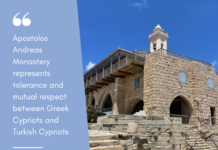Situated at the maritime crossroads of the eastern Mediterranean basin, Cyprus has a rich and varied history. Many invaders, settlers and immigrants have come here over the centuries, such as Greeks, Romans, Byzantines, Lusignans, Genoese, Venetians, Ottomans, British and Turks seek to take a part of Cyprus for themselves.All of them leaving some sort of influence on the island.
The first evidence of human habitation in Cyprus can be traced back to the Aceramic Neolithic period around 10, 000 BC, with the discovery of manmade artefacts at the site of Akrotiri Aetokremnou, on the Akrotiri Peninsula on Cyprus’ southern coast.
The discovery of copper around 3000BC changed life and the history of Cyprus dramatically, as the metal became the source of immense wealth and triggered the development of trade with neighbouring countries. The income generated from the excavating process was so high they could afford to built a whole fleet of ships for Alexander the Great.
Later on came in the Hellenistic & Roman Cyprus and Byzantian era. After that the Lusignan, Genoese & Venetian settled on Cyprus. During the Ottoman Empire, around 20, 000 Turks were settled on Cyprus following its capture, but the island was not high in the priorities of the ruling sultans. Ottoman rule lasted 300 years, in 1878, Turkey and Britain signed an agreement whereby Turkey would retain sovereignty of the colony. The birth of the new and independent Republic of Cyprus was realised on 16 August 1960. Unfortunately violence broke out in 1963, further dividing the Greek and Turkish communities.
The UN sent a peacekeeping force to the island in 1964 to support British troops patrolling the so-called ‘Green Line’ dividing Lefkosia.
The Island is divided until now, its among the most militarised places in the World with around 40,000 Turkish troops based on the north side and 4 different forces settled down on the south side – Cypriot ,Greek, British, United Nations.
Cypriots, whether Greek or Turkish, are proud of their nation and feel a strong sense of national identity. The division of their island in 1974 is viewed by many as occupation, but all of them hope in the unification of the island in the near future.


















